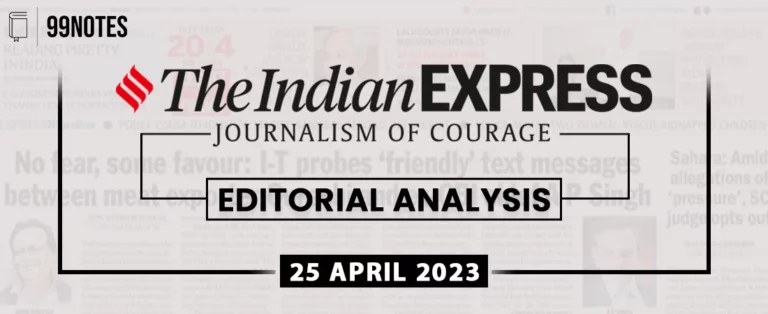18 July 2023 : Indian Express
Indian Express
18-July–2023
The Indian Express, CSE candidates can stay informed about current events and developments in India and around the world.
1. HUF AND UNIFORM CIVIL CODE
Prelims: Hindu Succession Act and Uniform Civil Code
Mains: GS-I < Social Empowerment> and GS-II, Indian Constitution < Uniform Civil Code>
Context:
- LAW Commission of India has initiated fresh deliberation on a Uniform Civil Code (UCC), which has triggered discussion on the institution of Hindu Undivided Family (HUF) and its separate treatment under tax laws.
Uniform Civil Code (UCC)
- A uniform civil code will mean a set of common personal laws for all citizens. Currently, for example, there are different personal laws for Hindus and Muslims. Personal law covers property, marriage and divorce, inheritance and succession.
- The Indian constitution has a provision for Uniform Civil Code in Article 44 as a Directive Principle of State Policy which states that The State shall endeavours to secure for the citizens a uniform civil code throughout the territory of India.
Hindu Undivided Family (HUF)
- It as a legal entity is based on an acknowledgment of customs by the Raj in India.
- It has seen as an institution that operated on a strong sense of blood ties and kinship to jointly exercise control over property in Hindu families.
- led to business arrangements based on Hindu personal laws rather than contractual arrangements.
- HUF portrayed a dual identity of a family-backed institution and an in- come-generating entity solely for the maintenance of the family.
- Such an arrangement probably played a part in the tax treatment that came to be incorporated in Indian law.
For income tax purposes:
-
- HUF is a family which consists of all persons lineally descended from a common ancestor and includes their wives and unmarried daughters.
- An HUF cannot be created under a contract, it is created automatically in a Hindu Family.
- An HUF has its own Permanent Account Number (PAN) and files tax returns independent of its members.
- An HUF has a Karta who is typically the eldest male person in the family, and manages its day-to- day affairs.
- Other members are coparceners; children are coparceners of their father’s HUF.
The Historical View
- The Indian Income Tax Act of 1886 recognised HUF under the term “person”.
- In an effort to shore up finances for World War I, the British introduced the Super Tax Act, 1917, which recognised HUF as a separate entity for tax purposes for the first time.
- Super tax was levied in addition to income tax.
- The idea of HUF as a distinct category of taxpayer was incorporated in the Income Tax Act, 1922, which formed the basis of the post- independence Income Tax Act, 1961.
- The law currently in force recognizes HUF as a per- son under Section 2(31)(ii).
- In between the pre- and post-Independence laws, government-instituted commit- tees critically examined the preferential tax treatment for HUFs.
- The Income Tax Enquiry Report of 1936 flagged the substantial rev-treatment
- But since the treatment of HUF under tax law was tied to the legal position of HUF under Hindu personal law, and owing to the pendency of the Hindu Code Bill during that period, the Commission decided not to change the tax position of HUF.
- The Justice Wanchoo Committee Report of 1971, explicitly stated that the institution of HUF was being used to avoid tax.
- In 2018, a Law Commission consultation paper declared that “it is high time that it is understood that justifying this institution on the ground of deep-rooted sentiments at the cost of the country’s revenues may not be judicious”.
The Tax Treatment
- From 1922 onward, additional exemption limit was allowed to HUFs compared to other taxpayers, including individuals, which allowed HUFs to pay lesser tax than other similarly placed taxpayers, despite earning the income in the same manner. This preferential exemption regime was done away with under the income tax Act. 1961.
- However, HUF as a separate tax entity provided another avenue for Hindu families to reduce their tax burdens.
Section 10(2) of the Income Tax
- Act, 1961 provides that any sum received by an individual as a member of HUF out of the HUF income is not to be included in her total income.
- This is in contrast to the first option in which one can ended up bearing the tax burden of receiving a income in his/her own name. Hence, the benefit is not only at the HUF level but also at an individual member level.
- Additionally, the HUF is entitled to claim expenses, exemptions, and several deductions from its taxable income, which further reduces the tax burden of a Hindu family.
HUF is not Available to All
- The concept of HUF is closely tied to the concepts of joint family & coparcenary.
- This is unique to Hindu personal law (deemed to include Jains, Buddhists & Sikhs).
- Kerala abolished the joint family system in 1975 through the Kerala Hindu Joint Family (Abolition) Act, 1975.
- The Supreme Court adjudicated on the interplay of this abolition with the Income Tax Act in CIT vs. N. Ramanathan Reddiar (HUF) (1996) by holding that once the entity of joint family and HUF has been abolished by a competent legislature.
- The Tax Department can no longer make an assessment on an HUF assesses. As a corollary, the individual taxpayer also can’t avail of tax benefits by creation of an HUF.
- However, this benefit of statutory tax planning is not available to a taxpayer of other religions, such as Muslims, Christians, Parsis, etc., which raises concerns over the lack of uniform application of tax laws.
- De hors the issue of UCC, it can be argued that granting an additional treatment that lowers the tax burden only on the basis of religion is arbitrary, and may fall foul of Article 14 and Article 15 of the Constitution.
2. New norms for Senior Advocate: what changes
Prelims: <Judiciary>
Mains: GS-II <Functioning of the Judiciary>
Context:
- The Supreme Court has published fresh guidelines for the designation of Senior Advocates, after a plea sought modifications of the norms in effect since 2018.The verdict on the plea as delivered on May 12.
- The 2018 guidelines had come in the wake of an SC ruling in the 2017 Indira Jaising v. Union of India case.
Senior Advocates
- Senior advocates who are designated as senior advocates by the supreme court of India or by any High Court.
- The court can designate any advocate, with his consent, as senior advocate if in its opinion by virtue of his ability, standing at bar or special knowledge or experience in law the said advocate is deserving of such distinction.
- A senior advocate is not entitled to appear without an Advocate-on-Record in the Supreme Court or without a junior in any other court or tribunal in India.
- S/he is also not entitled to accept instructions to draw pleadings or affidavits, advice on evidence or do any drafting work of an analogous kind in any court or tribunal in India or undertake conveyancing work of any kind whatsoever
- but this prohibition shall not extend to settling any such matter as aforesaid in consultation with a junior.
What are the 2018 guidelines?
- India’s first woman Senior Advocate, had sought greater transparency in the designation process, the plea by Jaising.
- The guidelines discouraged the system of “voting by secret ballot”, except in cases where it was “unavoidable”.
- A committee for the designation of Senior Advocates was set up,
- Chaired by the Chief Justice of India (CJI) and consisting of two senior-most SC judges, the Attorney General of India, and a “member of the Bar” nominated by the chair and other members.
- The CJI or any other judge could recommend the name of an advocate for the designation.
- Alternatively, advocates could submit their applications to the Permanent Secretariat, which would evaluate them on criteria like 10–20 years of legal practice, be it as an advocate, district judge, or judicial member of an Indian tribunal.
- The committee also interviewed the candidate and made an overall evaluation based on a point system that gave marks for years of practice, pro bono work, judgements, publications, and a personality test.
- Earlier Section 16 of the Advocates Act, 1961, governed the appointment of Senior Advocates.
- Section 16 (2) said an advocate could get the designation if the Supreme Court or a High Court was of the opinion that by virtue of his ability, standing at the Bar, or special knowledge or experience in law, he deserved the distinction.
Why are the guidelines being changed?
- The Centre filed an application seeking changes in the guidelines.
- The Centre said the “point-based system”, which awarded 40% weightage to publications, personality, and suitability gauged through the interview, dilutes the “esteem and dignity of the honour.”
- The application pointed to the rampant circulation of “bogus” journals where people could publish articles by “paying a nominal amount”.
- Further, the Centre argued that the requirements have resulted in “ousting otherwise eligible candidates” based on factors “not germane to the issue of being designated as a Senior Advocate”.
- Finally, the application sought to reinstate
- the rule of a simple majority by a secret ballot, where judges can express their views about any candidate “without any embarrassment”, reasoning that the secret ballot would minimise campaigning for votes by lawyers.
What are the New Changes?
- The new guidelines prescribe the minimum age for the designation as 45.
- This age limit may be relaxed by the Committee, the CJI, or an SC judge if they have recommended an advocate’s name.
- The 2023 guidelines specify that the CJI along with “any Judge of the Supreme Court” may recommend the name.
- The new norms change that to 5, while also including “guest lectures delivered in law schools and professional institutions connected with law”.
- Besides this, the weightage given to judgements (excluding orders that do not lay down any principle of law) has increased from 40 to 50 points.
For Enquiry

18 July 2023 : Daily Quiz

18 July 2023 : Indian Express

18 July 2023 : PIB

18 July 2023 : The Hindu Editorial Notes PDF

18 July 2023 : Daily Current Affairs

17 July 2023 : Daily Quiz

17 July 2023 : PIB

17 July 2023 : The Hindu Editorial Notes PDF

17 July 2023 : Daily Current Affairs

15 July 2023 : Daily Quiz
Daily Quiz 18 July 2023 : Daily Quiz 18 july 2023 : Daily quiz…
Indian Express 18 July 2023 : Indian Express Indian Express
18-July–2023
The Indian Express, CSE candidates can stay informed about current…
PIB 18 July 2023 : PIB PRESS INFORMATION BUREAU
18-July-2023
Daily Current Affairs For UPSC ,The PIB ( Press Information Bureau…
The Hindu 18 July 2023 : The Hindu Editorial Notes PDF The Hindu Editorial
18-July-2023
Daily Current Affairs For UPSC ,The Hindu Editorial Summary
Facebook-f
Twitter
Youtube
1. There…
Daily Current Affairs 18 July 2023 : Daily Current Affairs DAILY CURRENT AFFAIRS
18-July-2023
Daily Current Affairs For UPSC ,Daily Current affairs of The hIndu…
Daily Quiz 17 July 2023 : Daily Quiz 17 july 2023 : Daily Quiz…
PIB 17 July 2023 : PIB PRESS INFORMATION BUREAU
17-July-2023
Daily Current Affairs For UPSC ,The PIB ( Press Information Bureau…
The Hindu 17 July 2023 : The Hindu Editorial Notes PDF The Hindu Editorial
17-July-2023
Daily Current Affairs For UPSC ,The Hindu Editorial Summary
Facebook-f
Twitter
Youtube
1. India’s…
Daily Current Affairs 17 July 2023 : Daily Current Affairs DAILY CURRENT AFFAIRS
17-July-2023
Daily Current Affairs For UPSC ,Daily Current affairs of The hIndu…
Daily Quiz 15 July 2023 : Daily Quiz 15 July 2023 : Daily Quiz…


